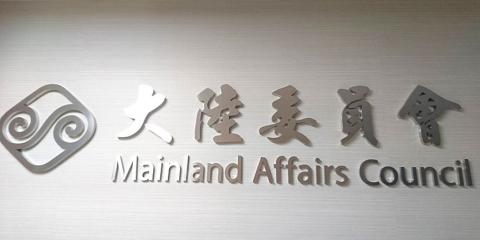Hong Kong on Friday deported 33 Taiwanese for planning to take part in a demonstration today over proposed amendments to the territory’s extradition laws, the Mainland Affairs Council said yesterday.
The deportees are Falung Gong members who were detained at Hong Kong International Airport upon entry and sent back to Taiwan in separate groups, sources said.
The council in a statement expressed regret that Hong Kong would turn away Taiwanese with valid travel documents.

Photo: Chung Li-hua, Taipei Times
“The freedoms of speech and religion are fundamental human rights that should be understood by Hong Kong authorities with rationality and respect,” the council said.
Taiwan’s representative office in Hong Kong said that it did not receive requests from the Taiwanese travelers prior to their attempted entry and that it has reached out to the airline to understand what had transpired.
The Hong Kong Legislative Council on Wednesday last week initiated deliberations on the controversial amendments, which critics have said could broaden Beijing’s power to extradite dissidents from the territory.
Opponents of the proposal are expected to stage a demonstration today to demand that the council retract the bill.
The Hong Kong government as of press time last night had no comment regarding the deportations.
The incident has deepened fears that Hong Kong has established a blacklist to bar people whose opinions are disagreeable to Beijing from entering the territory.
In a 2008 document, the Hong Kong Security Bureau told the Legislative Council that it had established a system to prevent people who are “detrimental to the public interest of Hong Kong” from entering the territory, but disavowed the existence of a list of persona non grata.

Taiwanese actress Barbie Hsu (徐熙媛) has died of pneumonia at the age of 48 while on a trip to Japan, where she contracted influenza during the Lunar New Year holiday, her sister confirmed today through an agent. "Our whole family came to Japan for a trip, and my dearest and most kindhearted sister Barbie Hsu died of influenza-induced pneumonia and unfortunately left us," Hsu's sister and talk show hostess Dee Hsu (徐熙娣) said. "I was grateful to be her sister in this life and that we got to care for and spend time with each other. I will always be grateful to

UNITED: The premier said Trump’s tariff comments provided a great opportunity for the private and public sectors to come together to maintain the nation’s chip advantage The government is considering ways to assist the nation’s semiconductor industry or hosting collaborative projects with the private sector after US President Donald Trump threatened to impose a 100 percent tariff on chips exported to the US, Premier Cho Jung-tai (卓榮泰) said yesterday. Trump on Monday told Republican members of the US Congress about plans to impose sweeping tariffs on semiconductors, steel, aluminum, copper and pharmaceuticals “in the very near future.” “It’s time for the United States to return to the system that made us richer and more powerful than ever before,” Trump said at the Republican Issues Conference in Miami, Florida. “They

REMINDER: Of the 6.78 million doses of flu vaccine Taiwan purchased for this flu season, about 200,000 are still available, an official said, following Big S’ death As news broke of the death of Taiwanese actress and singer Barbie Hsu (徐熙媛), also known as Big S (大S), from severe flu complications, the Centers for Disease Control (CDC) and doctors yesterday urged people at high risk to get vaccinated and be alert to signs of severe illness. Hsu’s family yesterday confirmed that the actress died on a family holiday in Japan due to pneumonia during the Lunar New Year holiday. CDC Deputy Director-General Tseng Shu-hui (曾淑慧) told an impromptu news conference that hospital visits for flu-like illnesses from Jan. 19 to Jan. 25 reached 162,352 — the highest

TAIWAN DEFENSE: The initiative would involve integrating various systems in a fast-paced manner through the use of common software to obstruct a Chinese invasion The first tranche of the US Navy’s “Replicator” initiative aimed at obstructing a Chinese invasion of Taiwan would be ready by August, a US Naval Institute (USNI) News report on Tuesday said. The initiative is part of a larger defense strategy for Taiwan, and would involve launching thousands of uncrewed submarines, surface vessels and aerial vehicles around Taiwan to buy the nation and its partners time to assemble a response. The plan was first made public by the Washington Post in June last year, when it cited comments by US Indo-Pacific Commander Admiral Samuel Paparo on the sidelines of the Shangri-La Dialogue